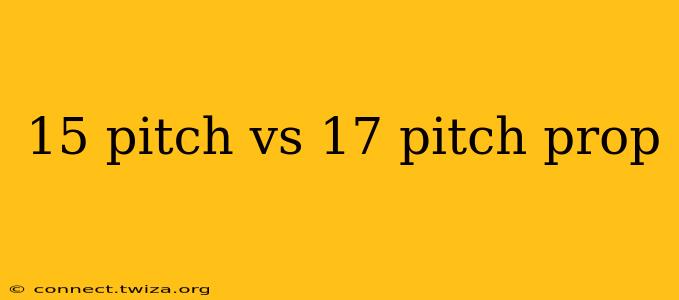15-Pitch vs. 17-Pitch Propeller: Understanding the Differences and Choosing the Right One
Choosing the right propeller for your boat or aircraft is crucial for optimal performance and efficiency. One key factor to consider is the pitch. This article delves into the differences between 15-pitch and 17-pitch propellers, helping you understand which might be best suited to your needs. We'll cover key aspects like speed, acceleration, and fuel efficiency to give you a complete picture.
What Does Propeller Pitch Mean?
Before diving into the comparison, let's define propeller pitch. Pitch refers to the theoretical distance a propeller would travel in one complete revolution if it were moving through a solid, rather than fluid, medium. A higher pitch number (like 17) means the propeller will move a greater distance per revolution, while a lower pitch (like 15) means less distance per revolution. This seemingly simple difference has significant implications for your vessel's performance.
15-Pitch Propeller: Characteristics and Applications
A 15-pitch propeller is generally associated with:
- Faster acceleration: Because it moves less distance per revolution, it requires less engine power to get up to speed. This makes it ideal for applications requiring quick acceleration, such as waterskiing or quickly maneuvering in tight spaces.
- Better low-speed performance: The lower pitch helps maintain better control and maneuverability at lower speeds.
- Potentially higher fuel consumption at higher speeds: To reach top speed, the engine may need to work harder, potentially resulting in increased fuel consumption compared to a higher-pitch propeller.
17-Pitch Propeller: Characteristics and Applications
A 17-pitch propeller, conversely, is known for:
- Higher top speed: Because it travels a greater distance per revolution, it allows the engine to reach higher speeds with a given RPM. This makes it more suitable for applications where top speed is prioritized.
- Better fuel efficiency at cruising speed: Once at cruising speed, the engine may operate more efficiently, resulting in better fuel economy compared to a lower-pitch propeller.
- Slower acceleration: Achieving higher speeds takes more time due to the increased distance the propeller needs to cover in each revolution.
Which Pitch Is Right for Me? Factors to Consider
The optimal propeller pitch depends heavily on several factors:
- Engine power: A more powerful engine can effectively utilize a higher-pitch propeller.
- Boat type and weight: Heavier boats may benefit from a lower pitch for better acceleration, while lighter boats might handle a higher pitch well.
- Intended use: Waterskiing or other activities requiring quick acceleration would favor a lower pitch, while long-distance cruising might benefit from a higher pitch for better fuel efficiency at cruising speed.
- Hull design: The hull's design impacts propeller performance, and the optimal pitch will vary accordingly.
What About Slippage?
It's crucial to understand that the theoretical pitch is rarely the actual distance the propeller moves the boat. Slippage, the difference between theoretical pitch and actual distance, is influenced by factors such as boat speed, propeller design, and water conditions. Slippage is inherent to propeller operation and must be considered when selecting a propeller. A higher pitch propeller might experience higher slippage at low speeds.
How to Determine the Right Propeller Pitch for Your Boat?
Choosing the right propeller requires careful consideration of your boat's specifications, intended use, and engine performance. Consulting a marine professional or using online propeller calculators can provide valuable assistance in determining the optimal pitch for your specific needs. They can account for slippage and other variables to ensure the best possible performance.
Frequently Asked Questions (FAQ)
What happens if I use a propeller with too much pitch? Using a propeller with too high a pitch will likely result in slower acceleration and a lower top speed than optimal, because your engine may not be able to turn the prop at a high enough RPM to achieve its potential.
What happens if I use a propeller with too little pitch? Conversely, a propeller with too little pitch may result in high RPM but with a lower-than-expected top speed, possibly increasing fuel consumption. The engine might be working harder than necessary.
Can I change the pitch of a propeller? No, the pitch of a propeller is determined by its design and cannot be changed. You need to replace the propeller with one of a different pitch.
This article provides a general overview. Remember to consult professionals for precise recommendations tailored to your specific boating needs. Selecting the correct propeller pitch is key to maximizing performance and fuel efficiency.
